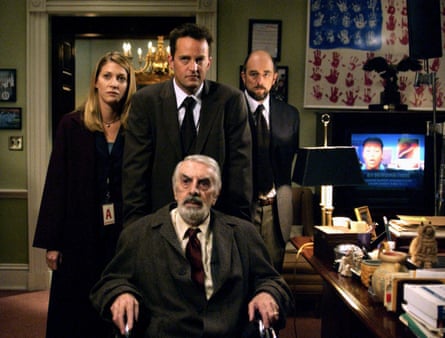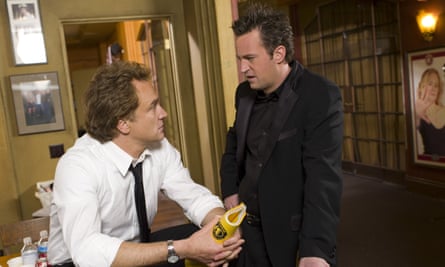Matthew Perry would still have merited TV immortality if he’d never appeared in anything after Friends: 99.9% of actors spend their careers failing to land a role like Chandler Bing. Just as James Gandolfini can be remembered as a great dramatic actor on the strength of Tony Soprano alone, the brilliance of Perry – who died this week aged 54 – is all there in Chandler. Perry understood how to make the funny lines funnier and the so-so lines funny enough, doing his job so well that he created a particular sense of humour that spread way beyond the show itself. It’s just obvious when someone you know is a Chandler, or when you make a Chandler joke yourself: such definitive TV roles are exceptionally rare.
The rest of the cast of Friends have, understandably, struggled to match their biggest success, perhaps because for them, their Friends character isn’t a basis for more interesting later roles. There isn’t a lot left to explore in Joey, Ross or Monica. But a man who is funny all the time, who is funny when he knows he ought to be serious, who is always on alert, waiting for the people around them to do or say something that he can turn into a joke? Even in a show as peppy and smooth as Friends, there was always an implied darkness there below the surface, and despite his personal problems meaning he was the least prolific of the Friends cast in his solo career, Perry’s willingness to walk into those shadows makes his post-Friends catalogue the most interesting of them all. In flashes, it might even be his best work.
after newsletter promotion
The classic non-Friends Perry role is, or ought to have been, Studio 60 on the Sunset Strip. Created by West Wing supremo Aaron Sorkin and set behind the scenes of a Saturday Night Live-ish comedy spectacular, it was a show about creativity at the highest level and under the most intense pressure, what that takes out of the people responsible, especially when their obligation is to be funny, and what sort of people are attracted to a life where something as nebulous and unimportant as comedy becomes a matter of life and death. As head writer Matt, a man perpetually haunted by the clock on his office wall counting down the seconds until the next show, Perry understood this perfectly – better than Sorkin himself, who gradually ran Studio 60 into the ground during its one and only season, weighing it down with ponderously written romances and a serious political subplot that suggested he’d rather be back on The West Wing.
Perry, however, stayed dead on it throughout, taking the chance to play not a funny man, but a man whose business it is to be funny, harvesting anything and everything around him and exploiting it for laughs. He was better than anyone at nailing Sorkin’s turbo-speed dialogue and adept at finding subtler, gentler notes in the gaps between the lines than was possible in a sitcom. But the soul of Perry’s performance was in its closeness to his own personality. Sometimes that was true to what is now a painful extent: the scene where his assistant, Suzanne (Merritt Wever), deduces that he is using prescription drugs to fuel his endless quest for creative validation is an exceptionally brave piece of acting by Perry, who by then was widely known to have been battling drink and drug addiction throughout his time on Friends.
Like Studio 60, the rest of Perry’s oeuvre outside Friends is a collection of glimpses, cameos, what-might-have-beens. He’d already worked with Sorkin on The West Wing itself, in a brief arc as a Republican lawyer who ends up employed by the Democratic White House but gets chewed up by a scandal happening way above him. That role suggests he ought to have been regularly popping up as enjoyably smart and spiky high-achievers, which would have been fun – and he was perfectly capable of doing plainly wholesome and likable heroes as well, as in the nice but inessential TV movie The Ron Clark Story.

A bigger loss is his potential as a villain. In The Good Wife and The Good Fight, Perry is fabulously snake-like as lying, scheming lawyer Mike Kresteva, whose facility with words lets him twist the truth into malign new shapes. There’s a moment where Kresteva is furiously blackmailing Peter Florrick (Chris Noth), and is interrupted by random strangers wanting to share their elevator – Kresteva switches his voice up an octave to politely ask them to wait for the next one, before resuming his attack with a toxic growl. For a moment, he’s Chandler again – but when he was other characters, Matthew Perry was just as brilliant.

